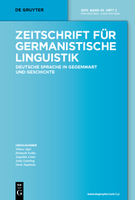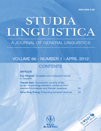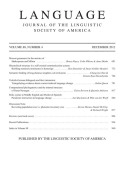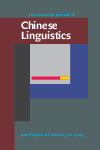
Lingue e Linguaggio
Scope & Guideline
Navigating the Complexities of Linguistic Phenomena
Introduction
Aims and Scopes
- Syntax and Sentence Structure:
Research on the formal and conceptual criteria that define the structure of sentences, including argument structure and the role of syntax in language processing. - Morphology and Word Formation:
Exploration of morphological processes, particularly in Italian, and their implications for understanding language development and structure. - Language Acquisition and Processing:
Studies focusing on how different factors, such as age and bilingualism, affect language learning and comprehension, especially in children. - Cross-Linguistic Comparisons:
Investigations into similarities and differences across languages, using comparative analyses to highlight unique linguistic properties and processes. - Historical and Diachronic Linguistics:
Research that examines the evolution of language over time, including diachronic studies of specific linguistic elements and their transformations. - Cognitive Linguistics:
Studies that delve into the cognitive aspects of language processing, including how linguistic structures are represented and understood in the mind.
Trending and Emerging
- Computational Linguistics and Deep Learning:
The integration of computational methods, particularly deep learning, in linguistic research is on the rise, reflecting a growing interest in utilizing technology for language analysis and processing. - Argument Structure and Syntax:
A notable increase in studies focusing on the intricacies of argument structure within syntax, revealing a deeper exploration of how arguments are represented and processed in various languages. - Cognitive Processing in Language Learning:
Research examining cognitive factors affecting language acquisition, particularly in bilingual and multilingual contexts, has gained traction, emphasizing the cognitive aspects of linguistic proficiency. - Interdisciplinary Approaches to Linguistics:
The journal is increasingly publishing works that draw from various disciplines, including psychology, education, and technology, showcasing a trend towards interdisciplinary research in linguistics. - Empirical Studies on Language Use:
There is a growing emphasis on empirical research that investigates real-world language use, including studies based on corpora and naturalistic data, contributing to a more practical understanding of linguistic phenomena.
Declining or Waning
- Ancient and Undeciphered Scripts:
While studies on ancient scripts and their decipherment were once a focus, recent publications indicate a waning interest in this area, suggesting a shift towards more contemporary linguistic issues. - Static Models of Language:
Research that relies heavily on static or traditional models of language structure is becoming less prominent, as newer dynamic and computational approaches gain traction. - Bilingualism in Limited Contexts:
The exploration of bilingualism has shifted from narrow contexts to broader studies that encompass varying sociolinguistic factors, leading to a decrease in studies focused solely on limited bilingual settings. - Descriptive Linguistics without Empirical Basis:
There appears to be a decline in purely descriptive studies that lack empirical backing, as the journal increasingly favors research grounded in data-driven methodologies.
Similar Journals

Italian Journal of Linguistics
Connecting scholars through impactful linguistic studies.Italian Journal of Linguistics is a prominent academic journal published by PACINI EDITORE, dedicated to advancing the understanding of linguistic theory and application. With its inception in 1996, the journal has fostered scholarly discourse and continues to contribute to the field through rigorous peer-reviewed articles. Operating under the prestigious field of linguistics, the journal currently holds a respectable Q3 quartile ranking as of 2023, showcasing its relevance in the academic community. It also ranks in the top 30% of journals in both Arts and Humanities and Social Sciences disciplines, reflecting its impactful contributions documented in Scopus rankings. While the Italian Journal of Linguistics is not an open-access journal, it offers invaluable insights and innovative research findings, making it an essential resource for researchers, professionals, and students keen on exploring the nuances of language and linguistics. Based in Pisa, Italy, the journal serves as a significant platform for both contemporary studies and classic investigations in linguistics, appealing to an international audience devoted to this ever-evolving field.

Journal of Portuguese Linguistics
Advancing Knowledge in Portuguese LinguisticsThe Journal of Portuguese Linguistics is an esteemed peer-reviewed academic journal published by UBIQUITY PRESS LTD, dedicated to the exploration of the rich complexities of the Portuguese language and its various linguistic dimensions. With an ISSN of 1645-4537 and an E-ISSN of 2397-5563, this open-access journal has been disseminating valuable research since 2002, ensuring that knowledge is accessible to all scholars, professionals, and students interested in Linguistics. Based in Portugal, it features a distinct focus on the linguistics pertinent to the Portuguese language, facilitating discussions that span theoretical and applied interests. The journal holds a respectable Q3 quartile rank in the field of Linguistics and Language, reflecting its growing significance and contribution to academia, as evidenced by Scopus rankings that place it in the 71st and 68th percentiles in Arts and Humanities as well as Social Sciences. Researchers and practitioners alike will find Journal of Portuguese Linguistics to be an indispensable resource for fostering discourse and innovation in the study of language.

ZEITSCHRIFT FUR GERMANISTISCHE LINGUISTIK
Elevating the Discourse on German Language DynamicsZEITSCHRIFT FUR GERMANISTISCHE LINGUISTIK, published by WALTER DE GRUYTER GMBH, stands as a pivotal resource in the field of linguistics since its inception in 1973. With its ISSN 0301-3294 and E-ISSN 1613-0626, this esteemed journal serves as an essential platform for researchers and academics focused on the nuances of the German language and its linguistic frameworks. Catering to a diverse audience, the journal features high-impact articles and contributions consistent with rigorous academic standards, as evident from its Q1 categorization in Linguistics and Language and its notable rankings in both the Arts and Humanities and Social Sciences domains. The journal's commitment to advancing knowledge in linguistics fosters a scholarly environment conducive to both emerging and established linguists. While not available through open access, ZEITSCHRIFT FUR GERMANISTISCHE LINGUISTIK remains influential, drawing readers keen on exploring developmental and educational paradigms alongside linguistic theories. With a convergence of research that spans until 2024, it represents a comprehensive body of work integral to the evolving landscape of linguistic studies in Germany and beyond.

STUDIA LINGUISTICA
Championing Scholarly Excellence in LinguisticsSTUDIA LINGUISTICA is a prestigious journal published by Wiley, focusing on the dynamic and multifaceted fields of Linguistics and Language. With an ISSN of 0039-3193 and an E-ISSN of 1467-9582, the journal has been a vital resource for academics since its inception in 1947, diligently converging insights from history and philosophy of science alongside contemporary linguistic research. Demonstrating excellent scholarly impact, STUDIA LINGUISTICA proudly holds a Q1 ranking in Linguistics and Language as well as a Q2 in History and Philosophy of Science as of 2023, indicating its significance within these academic domains. Furthermore, it ranks in the top percentiles among similar journals, with a commendable 73rd percentile in Language and Linguistics and 70th in related social sciences. Although it does not offer Open Access, its contribution to the discourse of language studies is underpinned by rigorous peer-review processes and commitment to advancing theoretical and empirical research. For researchers, professionals, and students alike, STUDIA LINGUISTICA remains an essential platform for disseminating impactful linguistic scholarship worldwide.

Suvremena Lingvistika
Illuminating the Complexities of Language and Communication.Suvremena Lingvistika is a distinguished open-access journal published by the Croatian Philological Society, dedicated to advancing research in the field of linguistics and language. Since its establishment, the journal has been pivotal in promoting scholarly dialogue within the linguistics community, especially among researchers and academics in Croatia and beyond. With an ISSN of 0586-0296 and an E-ISSN of 1847-117X, the journal has transitioned to an open-access model since 2007, ensuring that research is freely accessible to all. As of 2023, it holds a respectable Q3 ranking in the Linguistics and Language category, reflecting its potential contribution to the field. The journal's scope encompasses a wide array of linguistic disciplines, encouraging both theoretical and empirical studies. Supportive of new research, Suvremena Lingvistika aims to foster innovative approaches and methodologies in linguistics, making it an essential resource for students, researchers, and professionals eager to explore the complexities of language. With its ongoing publication until 2024, it continues to shape the linguistic landscape, providing valuable insights and fostering collaboration among scholars globally.

Glossa-A Journal of General Linguistics
Exploring the Frontiers of Linguistic KnowledgeGlossa: A Journal of General Linguistics, published by the Open Library of Humanities, stands as a leading voice in the realm of linguistic research since its inception in 2016. With its Q1 category ranking in Linguistics and Language and impressive Scopus ranks encompassing the top 83rd and 81st percentiles in its respective fields, Glossa fosters a vibrant academic community committed to the rigorous exploration of language and linguistic theory. Operating under an open access model, the journal not only enhances the visibility of groundbreaking research but also ensures that valuable insights are accessible to a global audience. The journal's commitment to interdisciplinary dialogue makes it an indispensable resource for scholars, professionals, and students eager to engage with contemporary developments in linguistics. As it converges into 2024, Glossa continues to champion innovative scholarship and critical discourse that challenges conventional boundaries within the field.

Revue Roumaine de Linguistique-Romanian Review of Linguistics
Exploring Language in Depth.Revue Roumaine de Linguistique-Romanian Review of Linguistics, published by EDITURA ACAD ROMANE, is a distinguished journal dedicated to advancing the field of linguistics and promoting scholarly discourse in language-related research. With its ISSN 0035-3957, this journal has established itself as a valuable resource for researchers and practitioners alike, particularly within the linguistics and language categories where it holds a respectable Q3 ranking as of 2023. The journal covers a wide array of topics, focusing on both theoretical and applied linguistics, making it an essential platform for those interested in the latest developments, methodologies, and findings in the field. Although it currently does not operate under an open access model, the Romanian Review of Linguistics remains an impactful publication with its regular convergence of years from 2010 to 2023, providing a comprehensive archive for ongoing research endeavors. With its address located in Bucuresti, Romania, this journal continues to foster a vibrant academic community and supports the ongoing exploration of linguistic phenomena across diverse contexts.

LANGUAGE
Pioneering Research in Linguistics and LanguageLANGUAGE, published by the Linguistic Society of America, is a premier academic journal dedicated to the rigorous study of linguistic theory and practice. With an ISSN of 0097-8507 and E-ISSN 1535-0665, this esteemed journal has established itself as a leading publication in the field of linguistics since its inception. The journal has consistently maintained a high impact factor, being ranked in the Q1 category in Linguistics and Language for 2023, placing it among the top tier of academic journals. Notably, it also holds impressive Scopus rankings, being positioned at #75 out of 1088 in Arts and Humanities, and #89 out of 1167 in Social Sciences, demonstrating a significant impact and reach in the discipline. While it is not an open-access journal, LANGUAGE provides crucial insights into linguistic research, fostering a vibrant academic community. Spanning years from 1996 to 2024, it continues to be an essential resource for researchers, professionals, and students alike, aiming to advance the understanding of language in its myriad forms and functions.

International Journal of Chinese Linguistics
Advancing Knowledge in Chinese Language StudiesInternational Journal of Chinese Linguistics is a distinguished publication that delves into various aspects of linguistic studies pertaining to the Chinese language. Published by John Benjamins Publishing Co, this journal stands out for its commitment to advancing the knowledge and understanding of Chinese linguistics within the global academic community. With an impact factor that places it in the Q2 quartile of linguistics and language, the journal is indexed in prominent databases, achieving ranks of #501 in Arts and Humanities and #580 in Social Sciences. These rankings reflect the journal's dedication to maintaining high scholarly standards and its relevance in both linguistic research and practical applications. While not categorized as Open Access, the journal provides necessary access through institutional subscriptions, thereby ensuring that valuable research reaches a broad audience. Covering a wide range of topics from syntax and phonetics to sociolinguistics and applied linguistics, the International Journal of Chinese Linguistics serves as an essential resource for researchers, professionals, and students seeking to deepen their understanding of the intricate relationship between language and culture in the Chinese context. With converging years from 2019 to 2024, it continues to evolve, reflecting ongoing developments in the field.

Yuyan Kexue-Linguistic Sciences
Fostering Scholarly Exchange in Language StudiesYuyan Kexue-Linguistic Sciences, published by SCIENCE PRESS, is a pivotal academic journal dedicated to the field of linguistics. With its ISSN of 1671-9484, this journal seeks to explore and illuminate various linguistic phenomena, contributing significantly to the understanding of language in both theoretical and applied contexts. Emphasizing interdisciplinary research, it welcomes contributions that bridge linguistics with areas such as cognitive science, sociology, and communication studies. Although it currently does not offer open access, Yuyan Kexue-Linguistic Sciences aims to provide a platform for researchers, professionals, and students alike to engage with cutting-edge studies and emerging trends in linguistics. Its publication location in Beijing positions it as a vital contributor to the global discourse in the linguistic sciences, catering to both a national and international audience. As the journal continues to grow, it aspires to maintain high academic standards and foster scholarly exchange for years to come.